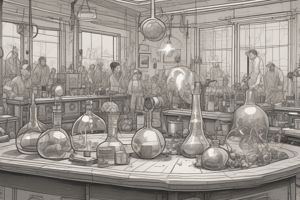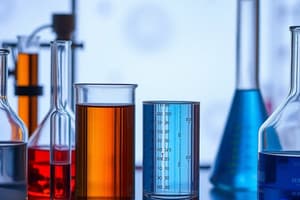Podcast
Questions and Answers
What is the main objective of a scientific experiment?
What is the main objective of a scientific experiment?
- To prove all hypotheses without exception.
- To conduct unstructured tests based on intuition.
- To increase knowledge about nature. (correct)
- To create novel hypotheses.
Which step is NOT part of the scientific method?
Which step is NOT part of the scientific method?
- Reporting the results.
- Ignoring the results to avoid bias. (correct)
- Asking a question and formulating a hypothesis.
- Collecting data through observations.
Who is credited with significant contributions to the development of the scientific method during the Middle Ages?
Who is credited with significant contributions to the development of the scientific method during the Middle Ages?
- Ibn al-Haytham. (correct)
- Aristotle.
- Galileo Galilei.
- Isaac Newton.
Which of the following best describes a hypothesis?
Which of the following best describes a hypothesis?
What key aspect distinguishes a scientific experiment from other types of experiments?
What key aspect distinguishes a scientific experiment from other types of experiments?
What differentiates deductive reasoning from inductive reasoning?
What differentiates deductive reasoning from inductive reasoning?
What is the role of the independent variable in an experiment?
What is the role of the independent variable in an experiment?
Which statement about randomized control experiments is true?
Which statement about randomized control experiments is true?
What is one potential disadvantage of randomized control experiments?
What is one potential disadvantage of randomized control experiments?
What distinguishes Francis Bacon's scientific method from Aristotle's approach?
What distinguishes Francis Bacon's scientific method from Aristotle's approach?
How does the scientific method contribute to technological advancements today?
How does the scientific method contribute to technological advancements today?
What does the dependent variable represent in an experiment?
What does the dependent variable represent in an experiment?
Which of the following best describes the function of statistical tools in randomized control experiments?
Which of the following best describes the function of statistical tools in randomized control experiments?
What fundamental question did Francis Bacon raise regarding Aristotle's philosophical authority?
What fundamental question did Francis Bacon raise regarding Aristotle's philosophical authority?
What is a significant feature of Isaac Newton's contribution to the scientific method?
What is a significant feature of Isaac Newton's contribution to the scientific method?
Flashcards
Scientific Experiment
Scientific Experiment
A structured process used to gather data and verify or reject a proposed explanation for an observation.
Hypothesis
Hypothesis
A suggested explanation that can be tested through experiments.
Scientific Method
Scientific Method
A collection of ordered steps designed to gain new knowledge in any field.
Scientific Inquiry
Scientific Inquiry
Signup and view all the flashcards
Aristotle
Aristotle
Signup and view all the flashcards
Variable
Variable
Signup and view all the flashcards
Independent Variable
Independent Variable
Signup and view all the flashcards
Dependent Variable
Dependent Variable
Signup and view all the flashcards
Inductive Reasoning
Inductive Reasoning
Signup and view all the flashcards
Deductive Reasoning
Deductive Reasoning
Signup and view all the flashcards
Experimental Method
Experimental Method
Signup and view all the flashcards
Experimental Group
Experimental Group
Signup and view all the flashcards
Control Group
Control Group
Signup and view all the flashcards
Randomization
Randomization
Signup and view all the flashcards
Study Notes
Scientific Experiments
- A scientific experiment is a process using measurements and tests to verify or refute a hypothesis.
- A hypothesis is a proposed explanation that needs testing.
- Experiments aim to discover new information about the natural world.
Scientific Method
- The scientific method is an ordered set of steps for gaining new knowledge.
- Steps include observation, questioning/hypothesis formation, experimentation, analysis, conclusion, and reporting.
- Experiments are used to test a hypothesis.
History of the Scientific Method
- The scientific method's roots lie in Greek philosophy, particularly Aristotle's logic.
- The method was largely lost during the Middle Ages.
- Key figures in its recovery include Ibn al-Haytham (Alhazen) and Robert Grosseteste.
- Francis Bacon developed and refined the scientific method.
Different Approaches to Scientific Reasoning
- Aristotle favoured a deductive approach, using general truths to predict specific outcomes.
- Bacon advocated an inductive method, deriving general principles from specific observations.
- Descartes emphasized deductive reasoning to minimize the influence of biases.
- Modern science uses both inductive and deductive approaches.
Types of Experiments
- Experimental (Randomized Control):
- Experimental units are randomly assigned to groups (experimental or control).
- The experimental group receives a treatment, the control group doesn't.
- Results are compared to determine the treatment's effect.
- Randomization minimizes bias.
- Real-world example: testing a new medicine (experimental group vs. control group given placebo).
- Quasi-Experimental:
- Subjects or groups are not randomly assigned; they already exist naturally.
- Useful for social sciences to measure effects of factors already present.
- Less reliable than randomized experiments regarding bias, but more feasible.
- Example: evaluating the impact of social programs on behaviour, or effects of an already introduced program.
- Observational:
- Researchers observe subjects and measure variables without manipulating conditions.
- No direct intervention on data generation.
- Establishes associations or correlations, not causation (e.g., studying the correlation between smoking and cancer).
- Examples of observational design types are developmental designs, cross-sectional designs, and survey designs.
Variables in Experiments
- Variables are observed characteristics or properties that can be measured.
- Independent variables are factors that are controlled by researchers.
- Dependent variables are the outcome being measured as a response to the independent variables.
- Experimental units are the elements or subjects to which treatments are applied.
Examples of Experiments
- Experimental: An environmental engineer studying wastewater treatment with constructed wetlands.
- Quasi-experimental: A basketball coach evaluating a new training program.
- Observational: A naturalist studying gorilla behaviour in the wild.
Studying That Suits You
Use AI to generate personalized quizzes and flashcards to suit your learning preferences.




